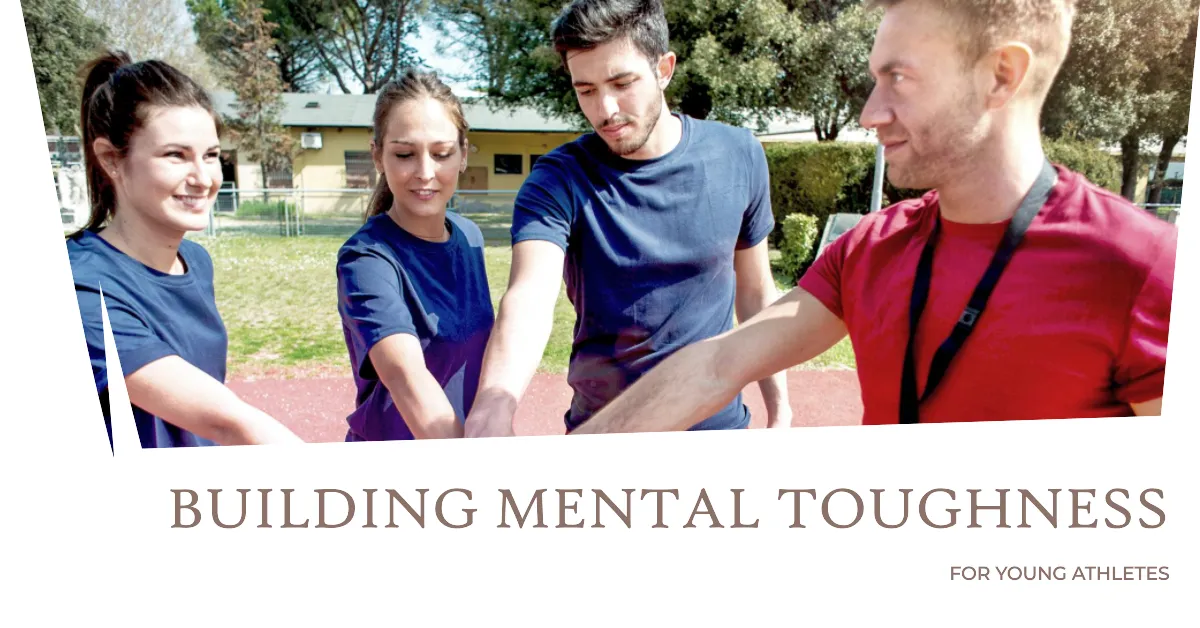In the realm of competitive sports, physical training is often prioritized to enhance performance and achieve success. However, it is crucial not to underestimate the significance of mental training for young athletes. Developing mental toughness can be the key differentiator between those who crumble under pressure and those who excel in high-stakes situations. As a mental toughness coach, I have witnessed firsthand the transformative power of equipping young athletes with the tools to build resilience, focus, and determination. In this article, we will explore effective strategies and techniques that can help cultivate mental toughness in young athletes and maximize their potential on and off the playing field.
Table of Contents
- 1 Why Is Mental Toughness Important for Young Athletes?
- 2 Teaching Young Athletes to Embrace Challenges and Setbacks
- 3 Encouraging Sports Kids to View Failures as Learning Opportunities
- 4 Emphasizing the Power of Persistence and Resilience
- 5 Developing Focus and Concentration Skills
- 6 Teaching Techniques for Improving Focus During Competitions
- 7 The Role of Mindfulness and Meditation in Enhancing Focus
- 8 Managing Performance Anxiety and Pressure
- 9 Strategies for Handling Nerves Before and During Games
- 10 Visualization Exercises to Reduce Anxiety Levels
- 11 Final Tips for Maintaining Composure
Why Is Mental Toughness Important for Young Athletes?
Every athlete dreams of achieving greatness and standing on top of that podium. But what sets apart the successful ones from the rest? It’s their mental toughness – a trait that can make all the difference in the world of sports. For young athletes, developing mental toughness is crucial, not only for their performance but also for their overall wellbeing.
One key factor that contributes to mental toughness is having a growth mindset. This means viewing challenges as opportunities for growth and learning rather than obstacles to overcome. Young athletes with a growth mindset are more willing to put in the effort, embrace failures as stepping stones toward success, and ultimately reach their goals.
Furthermore, mental toughness enables young athletes to set clear goals and take the necessary steps to achieve them. With a strong mindset, they become more resilient in the face of setbacks and learn how to push through adversity. By staying focused and determined despite obstacles, they develop persistence – an essential quality needed for long-term success.
Mental toughness plays an invaluable role in shaping young athletes into champions both on and off the field. It empowers them with a growth mindset, enabling them to embrace challenges as opportunities for growth. Moreover, it allows them to set goals effectively while remaining resilient against setbacks along the way.
It’s not just about physical strength; true strength lies within one’s mind. So let’s equip our young athletes with this powerful tool – let’s build their mental toughness!
Teaching Young Athletes to Embrace Challenges and Setbacks
Teaching young athletes to embrace challenges and setbacks is an essential part of building their mental toughness. As a mental toughness coach, my primary goal is to help these athletes realize that challenges and setbacks are not obstacles, but rather opportunities for growth. To achieve this, I often employ the mindset of reframing setbacks as learning experiences. By shifting their perspective from seeing failure as something negative to viewing it as a chance to improve and learn, young athletes can develop resilience and determination.
One effective strategy I use is highlighting examples of successful athletes who have overcome adversity in their careers. Sharing stories of renowned sports personalities like Michael Jordan or Serena Williams can provide valuable insights into the mindset required to push through challenges. By learning from these role models’ experiences, young athletes can understand that even the most accomplished individuals face setbacks but use them as stepping stones toward future success.
Moreover, it is crucial to encourage young athletes not only to embrace challenges but also to actively seek them out. Explaining that stepping outside of their comfort zone leads to personal growth and improved performance will motivate them to eagerly take on new challenges. Reinforcing the idea that overcoming adversity builds character sets a foundation for lifelong mental toughness skills that extend beyond athletics into all aspects of life.
Overall, teaching resilience in the face of challenges and setbacks is vital for developing mentally tough young athletes.
Encouraging Sports Kids to View Failures as Learning Opportunities
Part of developing mental toughness in young athletes is teaching them to view failures as learning opportunities. Many professional athletes have spoken about how their failures were crucial stepping stones on their path to success. Michael Jordan, arguably one of the greatest basketball players of all time, once said “I’ve missed more than 9000 shots in my career. I’ve lost almost 300 games. 26 times, I’ve been trusted to take the game-winning shot and missed. I’ve failed over and over and over again in my life. And that is why I succeed.” This mindset shift can be transformative for young athletes, as it encourages them to embrace challenges and setbacks rather than being discouraged by them.
When young athletes view failure as a chance to learn and grow, they become more resilient and motivated to push through difficult times. Instead of dwelling on their mistakes or feeling defeated, they start seeking ways to improve themselves. By analyzing what went wrong during a game or competition, they gain valuable insights into areas where they need further development or new strategies for success. This growth mindset fosters a hunger for knowledge and improvement that will carry them forward in both sports and life beyond the playing field.
By encouraging our sports kids to see failures as learning opportunities, we lay the groundwork for a mentally tough mentality that will serve them well throughout their athletic pursuits and beyond. As a mental toughness coach, it is important not only to teach specific strategies but also to instill this mindset early on in their journey.
Emphasizing the Power of Persistence and Resilience
One of the key lessons I emphasize to my athletes is the power of persistence and resilience. It’s not enough for young athletes to rely solely on their physical abilities; they must also develop a strong mindset that can weather challenges and setbacks. By teaching them the importance of persistence, we help them understand that failure is not permanent but rather an opportunity for growth.
Mental resilience plays a vital role in building mental toughness. When young athletes face adversity, such as losing a game or struggling with a new skill, it is through resilience that they learn to pick themselves up and keep going. We all know that success in sports requires hard work and determination, but without resilience, those efforts can easily be derailed by defeat or obstacles. By teaching young athletes to approach challenges as opportunities for growth, we equip them with the necessary tools to bounce back stronger than ever.
Ultimately, emphasizing the power of persistence and resilience in youth sports helps shape not only successful athletes but also resilient individuals who are better equipped to tackle life’s challenges outside of sports. Building their mental toughness through these qualities instills within them the belief that setbacks are temporary roadblocks on the path to success. With this mindset engrained in their actions both on and off the field, they will be unstoppable forces capable of achieving greatness in any endeavor they pursue.
Developing Focus and Concentration Skills
Developing focus and concentration skills is crucial for young athletes who want to build mental toughness. Many people assume that fitness and motivation are the only important factors in athletic success, but without the ability to stay focused, even the most talented athletes may struggle to reach their full potential.
One effective way to develop focus and concentration is through meditation. By setting aside just a few minutes each day for quiet reflection, athletes can train their minds to let go of distractions and stay present in the moment. This practice not only improves focus during competition but also enhances mental clarity and decision-making abilities off the field.
Another strategy is to incorporate visualization techniques into training routines. Athletes can visualize themselves successfully executing their sport-specific skills (mental rehearsal) or achieving their performance goals. This technique helps them prepare mentally for competitions, as they become more familiar with what it feels like to succeed in their desired outcomes. Developing focus and concentration skills requires consistent effort and dedication, but when mastered, these abilities can significantly enhance an athlete’s mental toughness both on and off the playing field.
Teaching Techniques for Improving Focus During Competitions

One of the key challenges young athletes face during competitions is maintaining focus and staying mentally sharp. It can be easy for their minds to wander or become distracted by the pressure of the moment. As a mental performance coach, you can teach several teaching techniques that can greatly improve an athlete’s ability to stay focused during high-pressure situations in their chosen sport.
Firstly, it’s important to teach athletes how to recognize when their focus starts to waver. This can involve developing self-awareness and understanding the signs of distraction, such as physical tension or negative thoughts. By identifying these cues early on, athletes can then use specific techniques, such as deep breathing exercises or positive self-talk, to redirect their attention back to the present moment.
Then, you can instruct them to apply mindfulness techniques, so they stay concentrated on the present moment and eliminate rumination. By focusing on what’s important now, athletes can improve their mental sharpness and negative emotions related to the event.
The Role of Mindfulness and Meditation in Enhancing Focus
The role of mindfulness and meditation in enhancing focus cannot be overstated when it comes to building mental toughness in young athletes. While it may seem like a modern trend, these practices have been employed for centuries to cultivate clarity and concentration. In a world filled with distractions, teaching young athletes the power of being fully present in the moment can dramatically improve their ability to stay focused on the task at hand.
Mindfulness and meditation provide athletes with invaluable tools to quiet the mind and direct their attention where it needs to go. By practicing these techniques regularly, young athletes learn how to tune out external noise and internal chatter, enabling them to tap into a state of flow. This heightened level of focus not only allows them to perform at their best but also helps ward off performance anxiety and self-doubt – two common barriers that hinder an athlete’s progress. Coaches who incorporate mindfulness training into their sessions empower their athletes with the skills they need to navigate stressors on not just game day but throughout life as well.
Furthermore, mindfulness practice fosters self-awareness, which plays a pivotal role in enhancing focus. When young athletes are aware of their thoughts, emotions, and physical sensations during sports performance, they gain insights into what triggers distraction or loss of focus. Armed with this knowledge, they can develop strategies tailored specifically toward maintaining concentration under pressure.
Managing Performance Anxiety and Pressure
As a mental toughness coach, one of the most common challenges I see among young athletes is performance anxiety and pressure. When it comes to achieving peak performance, confidence is key. However, in high-pressure situations such as game day or competition, doubts and fears can creep into an athlete’s mind, hindering their ability to perform at their best.
To manage performance anxiety and pressure effectively, it’s crucial for young athletes to develop strategies that work for them individually. Encourage them to focus on the present moment rather than worrying about outcomes or what others may think of their performance. Remind them that mistakes are part of the learning process and should not define their worth as an athlete. Teaching deep breathing exercises or visualization techniques can help athletes calm their nerves before stepping onto the field.
Another valuable tactic is encouraging self-talk that builds resilience and confidence. Coaches play a significant role in helping athletes identify negative self-talk patterns and replace them with positive affirmations. Emphasize the importance of having realistic expectations while acknowledging past accomplishments, providing a solid foundation for future success.
By instilling these practices early on in a young athlete’s journey, you are helping develop long-lasting mental toughness skills that will not only benefit them inside sports but also throughout various aspects of life. Remember: building mental toughness is an ongoing process fueled by consistent effort and dedication from both coaches and athletes alike!
Strategies for Handling Nerves Before and During Games
I often encounter young athletes who struggle with nerves before and during games. While it’s completely normal to feel anxious in a competitive environment, learning how to control these nerves is essential for building mental strength. One strategy that I recommend is deep breathing exercises. Taking slow, deep breaths activates the parasympathetic nervous system and helps calm the body and mind. Encourage your young athletes to practice this technique both in training sessions and before games so that it becomes second nature.
Another effective strategy is visualization (yup, that’s an important one and has many uses). By visualizing success and positive outcomes, athletes can build confidence and reduce anxiety. Encourage your young athletes to close their eyes and imagine themselves performing at their best in game situations. They should pay attention to every detail – the sounds of the crowd, the feeling of sweat on their brow, and the taste of victory. By consistently incorporating visualization into their routine, they will become more comfortable with high-pressure situations.
Furthermore, implementing pre-game rituals can also help alleviate nerve-induced stress. These rituals could be anything from listening to specific music or doing a quick warm-up routine before every game. The idea behind these rituals is that they provide a sense of familiarity and control in an otherwise unpredictable environment. Remind your young athletes that these rituals are personal to them; what works for one may not work for another.
Overall, handling nerves before and during games requires consistent practice but can greatly contribute to building mental toughness in young athletes.
Visualization Exercises to Reduce Anxiety Levels
One of the strategies I recommend to help young athletes reduce anxiety levels is practicing future visualization. Ask the kid to imagine themselves excelling in their sport several years from now – maybe even envisioning themselves playing at the collegiate level or competing internationally. This exercise reinforces long-term goals and allows them to see beyond any current challenges or setbacks they may be facing.
Another one is an after-game exercise. It incorporates visualizing their bodies melting down and feeling every muscle fiber and even all the blood vessels relaxing. By incorporating more senses into this exercise, it turns into visceralization – an advanced visualization exercise. It helps to wash off all the post-game tension and relax the hypertonic muscles by swiftly putting the athletes in a parasympathetic state.
By regularly incorporating these visualization exercises into their routine, young athletes can enhance relaxation techniques and become more confident in their abilities on the field or court.
Final Tips for Maintaining Composure

One of the most crucial skills mental game coaches can teach young athletes is how to maintain composure in high-pressure situations. While building mental toughness takes time and practice, it is worth every effort. Here are a few final tips to help your young athletes stay calm and composed when it matters most.
Firstly, emphasize the power of breathing. Teach them deep breathing techniques to use during critical moments in competition. By taking slow, deep breaths, they can effectively manage their heart rate and center their focus, reducing anxiety and enhancing clarity.
Another tip is to encourage positive self-talk. Remind your athletes to replace negative thoughts with positive affirmations during challenging moments. Help them cultivate an inner voice that supports their abilities and boosts confidence.
Lastly, remind your young athletes that mistakes are inevitable – they are part of the learning process. Encourage them not to dwell on errors but instead embrace them as opportunities for growth and improvement.
In summary, mastering composure is an essential aspect of developing an iron mindset in sports. By teaching proper breathing techniques, promoting positive self-talk, and embracing mistakes as learning opportunities, you can equip your young athletes with powerful tools to excel under pressure. Remember that building mental toughness takes time; patience and consistent practice will yield significant results on their journey toward success both on and off the field.




